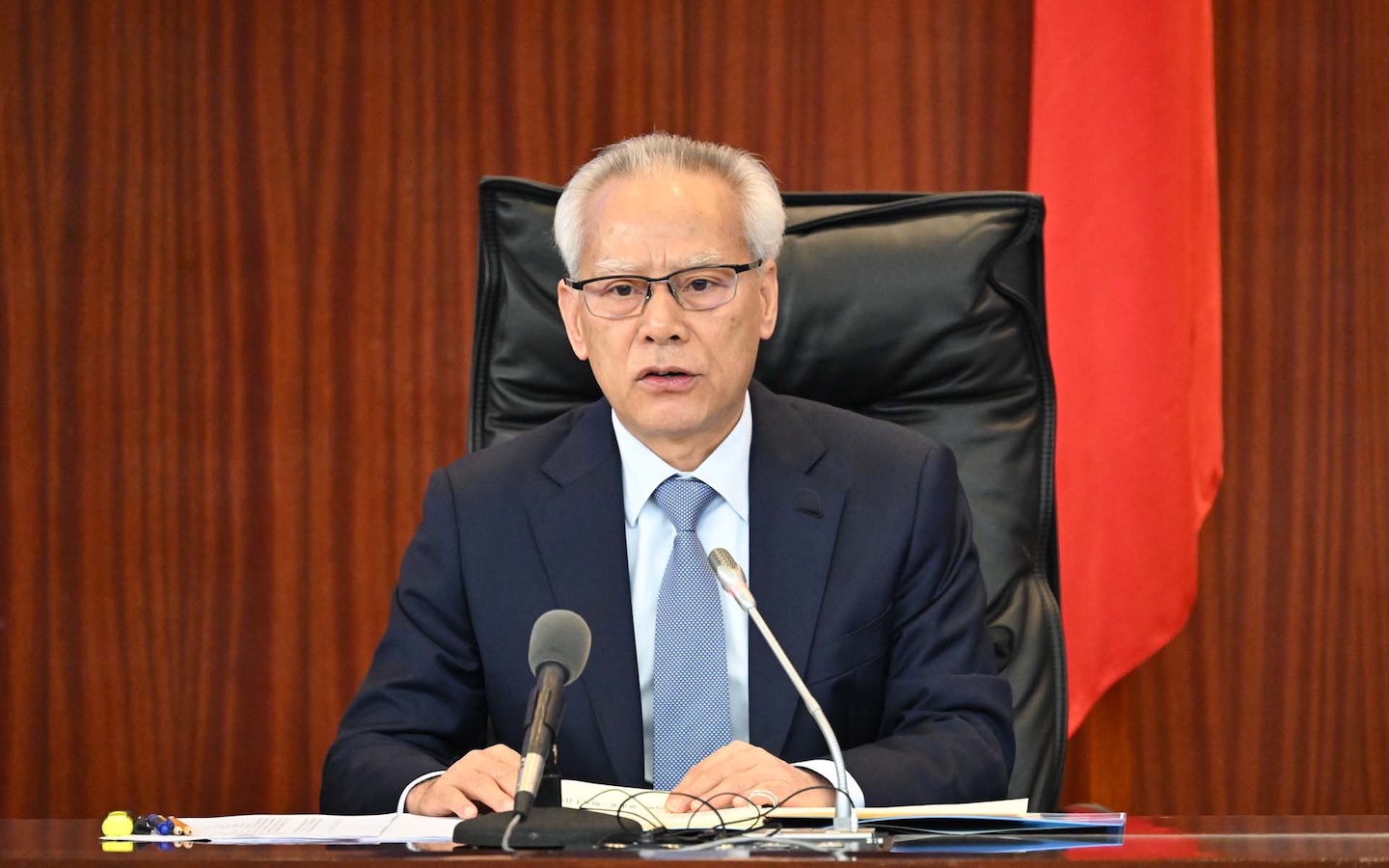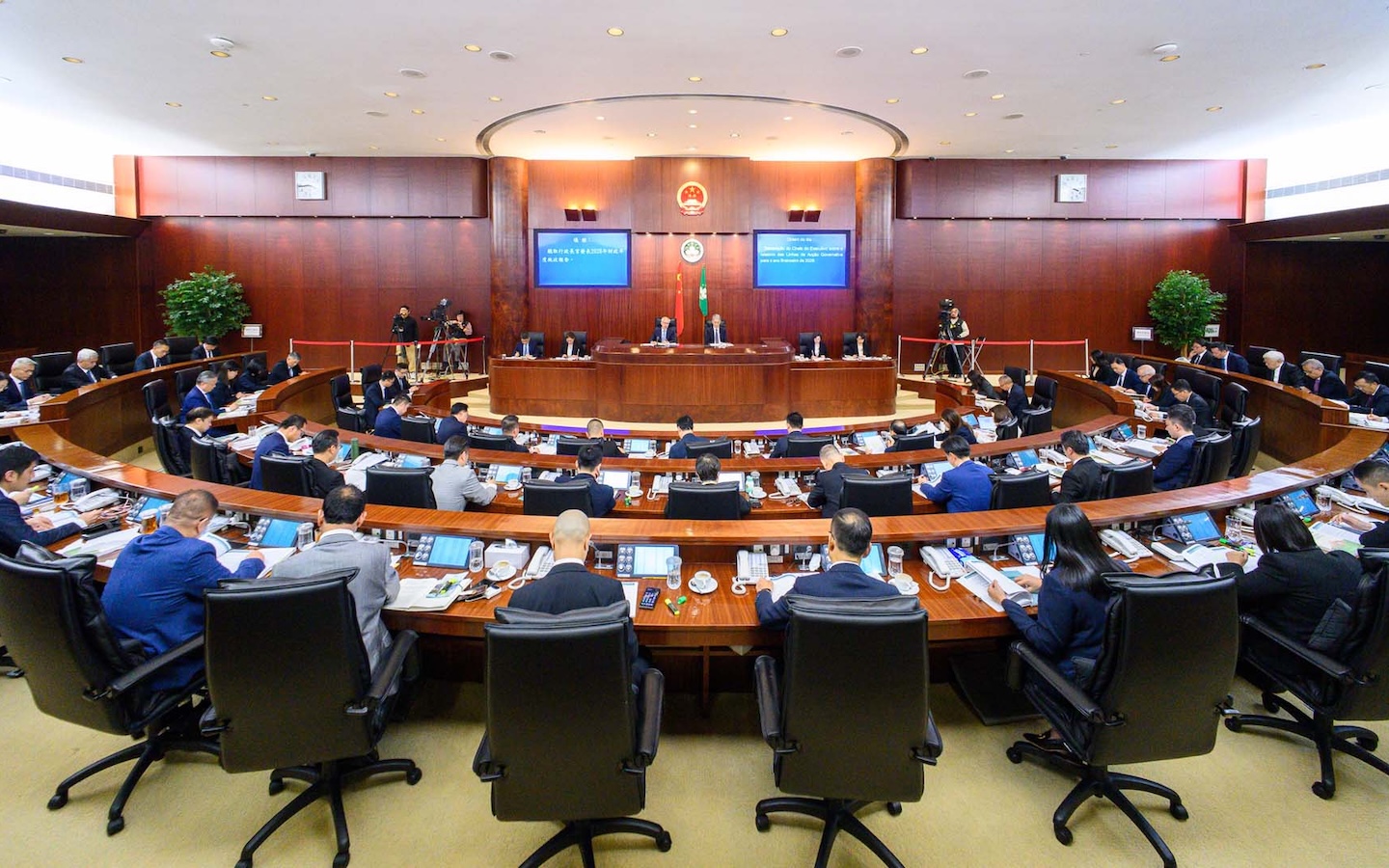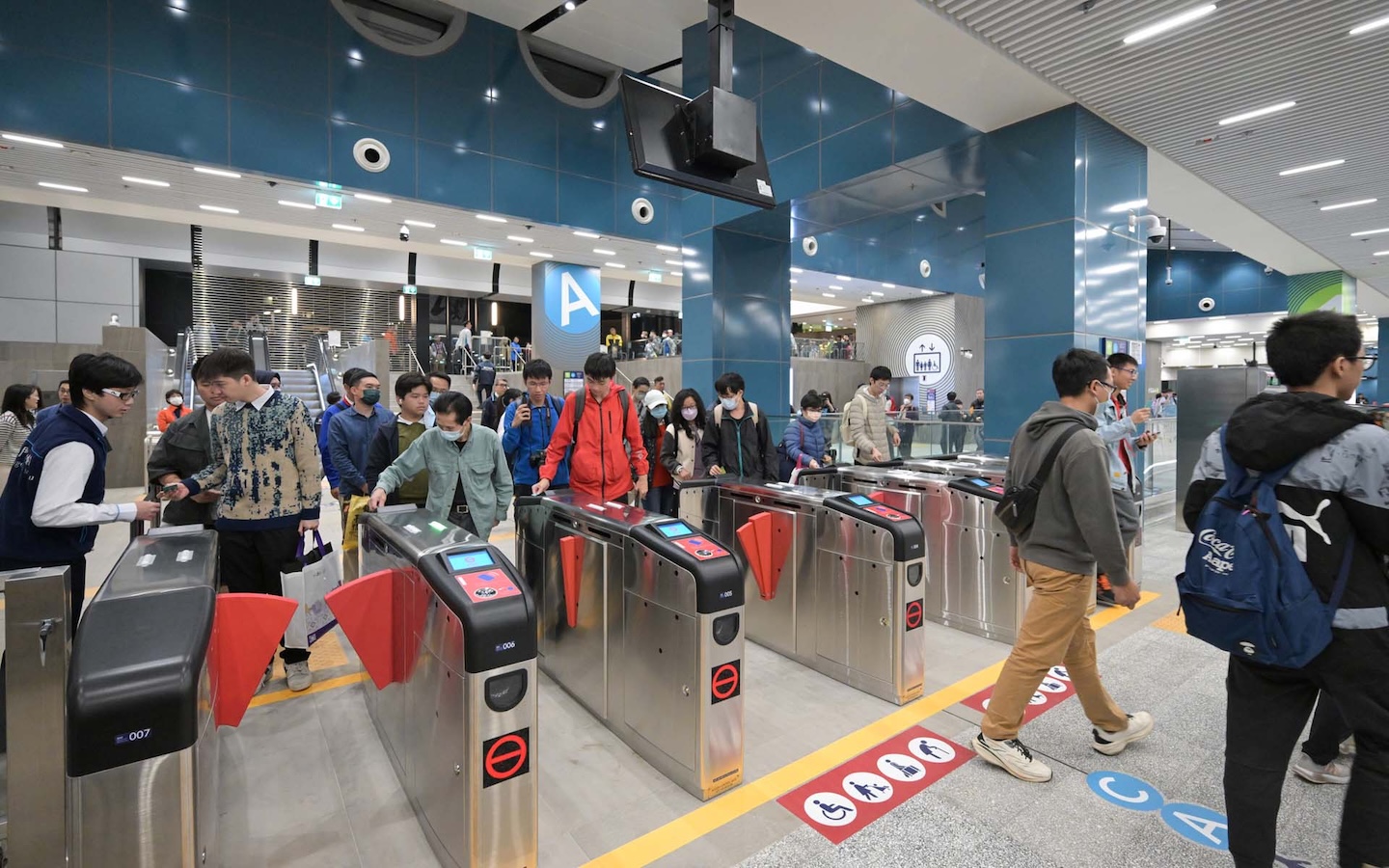TEXT Marco Carvalho
Stronger ties with the private sector, a reinforced attention to new forms of entrepreneurship, and a greater awareness of the expectations projected both by governments and businessmen. These are some of the new roads that the Forum Macao might tread in the future as it seeks to build on its successes.
A decade and a half after its inception, Forum Macao organised a conference to discuss its accomplishments during the last 15 years and to outline the institution’s strategies for the future. A future, Secretary‑General Xu Yingzhen believes, that should go hand‑in‑hand with a stronger connection with the private sector, mainly with small and medium-sized enterprises willing to take advantage of the opportunities already created by the Forum.

For that to happen, a few changes are yet needed. The high‑ranking representatives of the eight Portuguese‑speaking countries and the former officials of the institution – among them several former secretary‑generals and deputy secretary‑generals – that took part on the seminar, held on 21 March in Macao, reached a common conclusion: Forum Macao made possible a series of important achievements, but it must necessarily improve and take on a more dynamic, active role to fulfil the expectations of its members.
At 15, a person cannot yet be considered a grown‑up. With an institution like this Forum, the same thing happens,” Xu explained, responding to suggestions and remarks made by those who took part in the seminar. “It’s quite natural that we can find both qualities and faults in a mechanism, that it’s not yet fully developed. We have to think, to analyse these remarks, in order to improve our work.”
One of the most common observations expressed at the March conference centred on what countries like Angola, Timor‑Leste, Cabo Verde, and Guinea‑Bissau see as the weak connection between the Forum, the Macao Trade and Investment Promotion Institute (IPIM), and the China‑Portuguese‑‑speaking Countries Co‑operation and Development Fund.
Expectations and reality
Created in June 2013 to support development projects and investment in mainland China and the eight Portuguese ‑speaking countries that now participate in the Forum, the Fund has so far invested in only four projects: two in Brazil, one in Angola, and another in Mozambique.
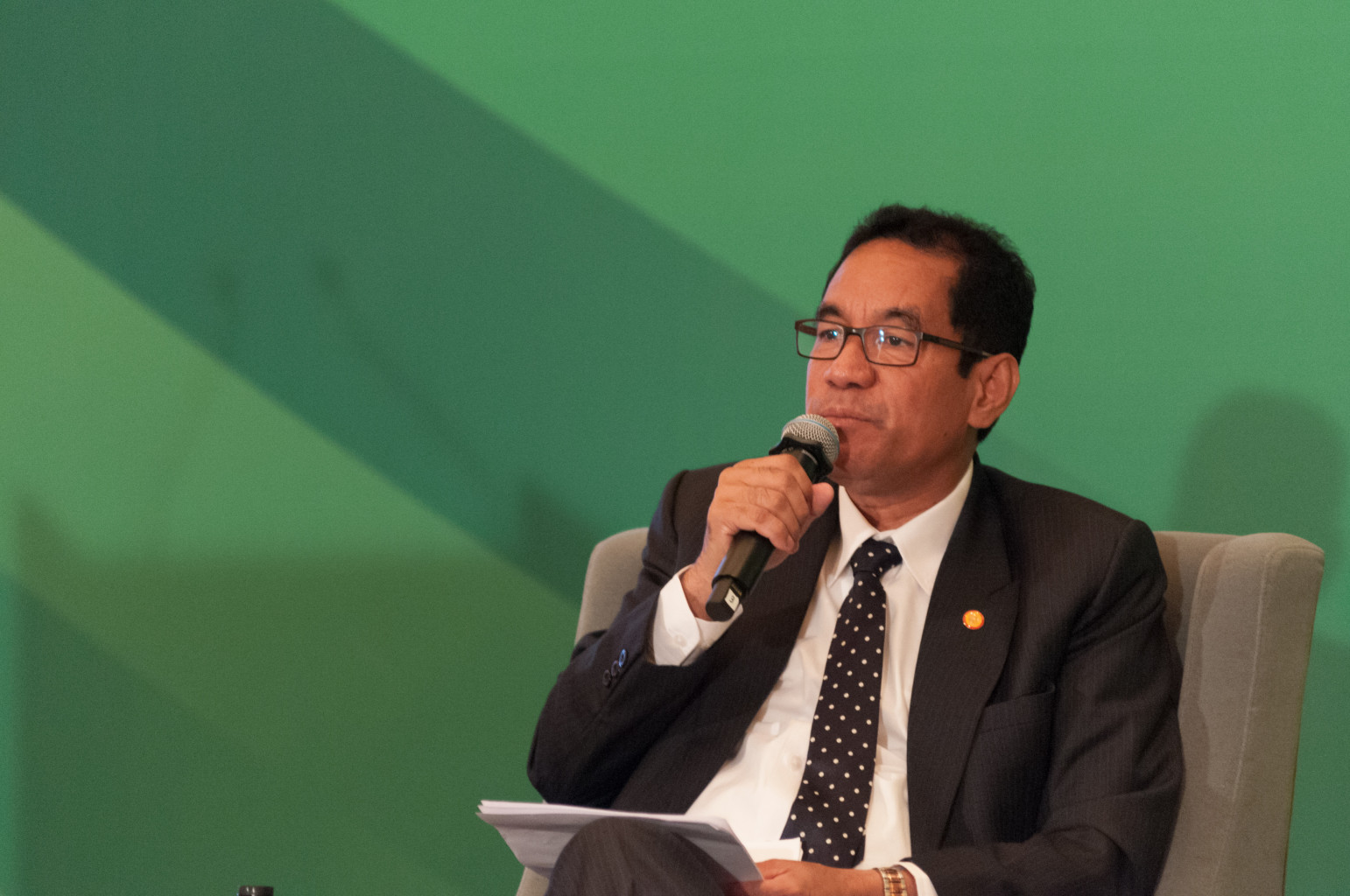
Arcanjo da Silva, former minister of Development for Timor‑‑Leste, now leads the country’s investment agency and it was as executive director of TradeInvest Timor‑Leste that he took part on the conference. He emphasised the broad need for developing human resources in his country: “To be able to conduct its work and face some challenges, the Timorese business community needs vocational and professional training.
This happens within the private sector, but also in the public one. They are both important because they both give a fundamental contribution to the future of Timor‑Leste,” he pointed out. “[We] would like Forum Macao to facilitate this process of professional capacity building in order to help our agents, whether they represent the public or the private sector, to improve their skillsets.”
Da Silva didn’t hide the fact that Díli places a great deal of expectations on Forum Macao, namely with the aim of toning down the country’s current dependence on oil industry revenues.
The very same remark was made by Agostinho André de Carvalho Fernandes, the representative of the Angolan Foreign Affairs Ministry in the Asia‑Pacific Region. He said that the Forum’s efficiency cannot be accurately assessed without acknowledging the fundamental aspect of gaining access to funding. Angola is one of three countries – the other two being Brazil and Mozambique – that managed to obtain some financing from the Co‑operation and Development Fund.
With their previous success and close ties – Angola is China’s second largest trade partner among the Forum member countries – he said that Angola might submit several other projects to the Fund’s appreciation in areas like the health sector, agribusiness, and the planning and construction of critical infrastructure.
The need for new funding procedures
“The fact that each of the eight members of the Forum has experienced and still has different paces of development should be taken into account by China,” said Ana Lima Barber.
As president of Cabo Verde TradeInvest, the trade and investment promotion agency of Cabo Verde, Barber believes that Forum Macao should focus on a different approach, one more attuned to the realities of small countries like Cabo Verde, Timor‑‑Leste, Guinea‑Bissau, and São Tomé and Príncipe:

“We expect a better approach to our private sector, one that can take into account our entrepreneurs. Our companies lack substantial size. We are talking about small and medium‑sized enterprises, sometimes even micro‑enterprises,” she explained.
Barber listed several areas – the agriculture and fishing industries among them – where the establishment of partnerships with foreign investors would be welcomed, although she recognised that the small Atlantic archipelago is at a disadvantage against similar proposals with wider margins of profitability.
“The amount of money that our companies need in terms of investment is probably too small for the way that China works and the criteria it establishes,” Barber alerted, adding that there are potential technical fixes to address this discrepancy: “We need to start looking to other kind of funding procedures, that may take into account the dimension of our enterprises. Funding procedures with a smaller ceiling, that may be more suitable for our own markets.”
Manuel Amante da Rosa, a Cabo Verdean diplomat who is a former deputy secretary‑general of Forum Macao between 2008 and 2011, went a step further in the intervention he made in the seminar. Amante da Rosa, currently the Cabo Verdean ambassador to Italy, claimed that the Co‑operation and Development Fund should “go back to its origins” and become more than a venture capital mechanism. “When the then prime‑‑minister of China announced the creation of the Fund in 2010, the idea was precisely to revitalise the Forum.”
Bruno Jauad offered a slightly different perspective on the issue of the applications submitted to the Fund. The head of the Directorate General for Promotion of Private Investment (DGPIP) of Guinea‑Bissau believes that an application not receiving the green light from the mechanism doesn’t necessarily mean that the project isn’t good enough.
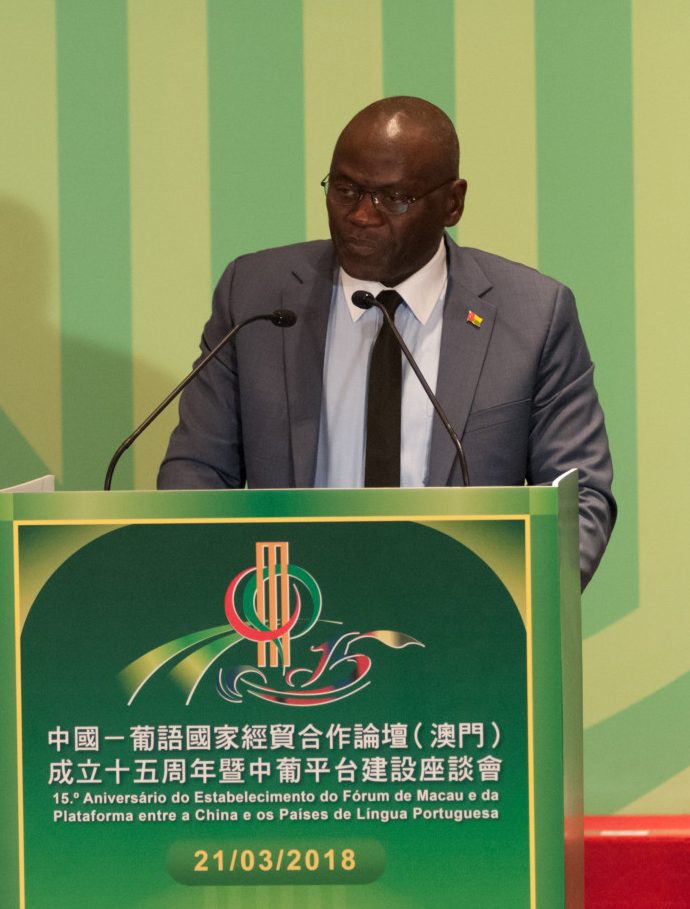
Jauad, who has witnessed Forum Macao blossoming up, would like to see the Fund play a more active role, providing assistance to the countries and enterprises that believe they have something worthy to offer:
“The eligibility of the proposals needs to be a fundamental factor. We know that every project, every proposal, has its own specificity, but we have to be able to have the capacity to formulate projects as accurately as possible and this kind of task is something that we can’t do by ourselves,” Jauad told Macao Magazine. “China Development Bank, through the Forum or some other institutions, should make technical assistance available. That’s the only way our companies, our entrepreneurs, will be able to set up proposals that might convince the people responsible for the Fund’s management.”
The Guinean authorities, he revealed, will submit once again to the Fund’s appreciation, two major infrastructure projects: the construction of a deep water port in Buba, southwest of Bissau, and the Saltinho hydroelectric project on the Corubal River.
The latest project to obtain financing from the China‑‑Portuguese ‑speaking Countries Co‑operation and Development Fund marks the second successful application by Brazilian authorities. “It’s a project related to the production of energy, but this time in the hydroelectric sector,” revealed Ambassador Marcos Caramuru de Paiva, on the sidelines of the 13th Ordinary Meeting of the Permanent Secretariat of Forum Macao, held on 22 March.
The Brazilian ambassador to China said that, if his country managed to have two different projects financed by the Fund, it is because they offer guarantees of profitability as well as a good rate of return in terms of investment. Caramuru endorsed the idea that the Fund should remain a business ‑intended mechanism and not merely a platform for official development assistance: “I don’t think that it is fair to claim that the challenges and the problems start with the attribution of resources. It’s a two‑way street. We need financial resources, it’s true, but the projects submitted for evaluation also need to have some quality,” he argued. “We are not talking about development aid. We are talking about investment, and when we are talking about investment, we have to be ready for some challenges.”
The apparent success of the Brazilian business approach within the Fund may be one of the reasons why Brasília decided to step up its involvement in the works of Forum Macao.
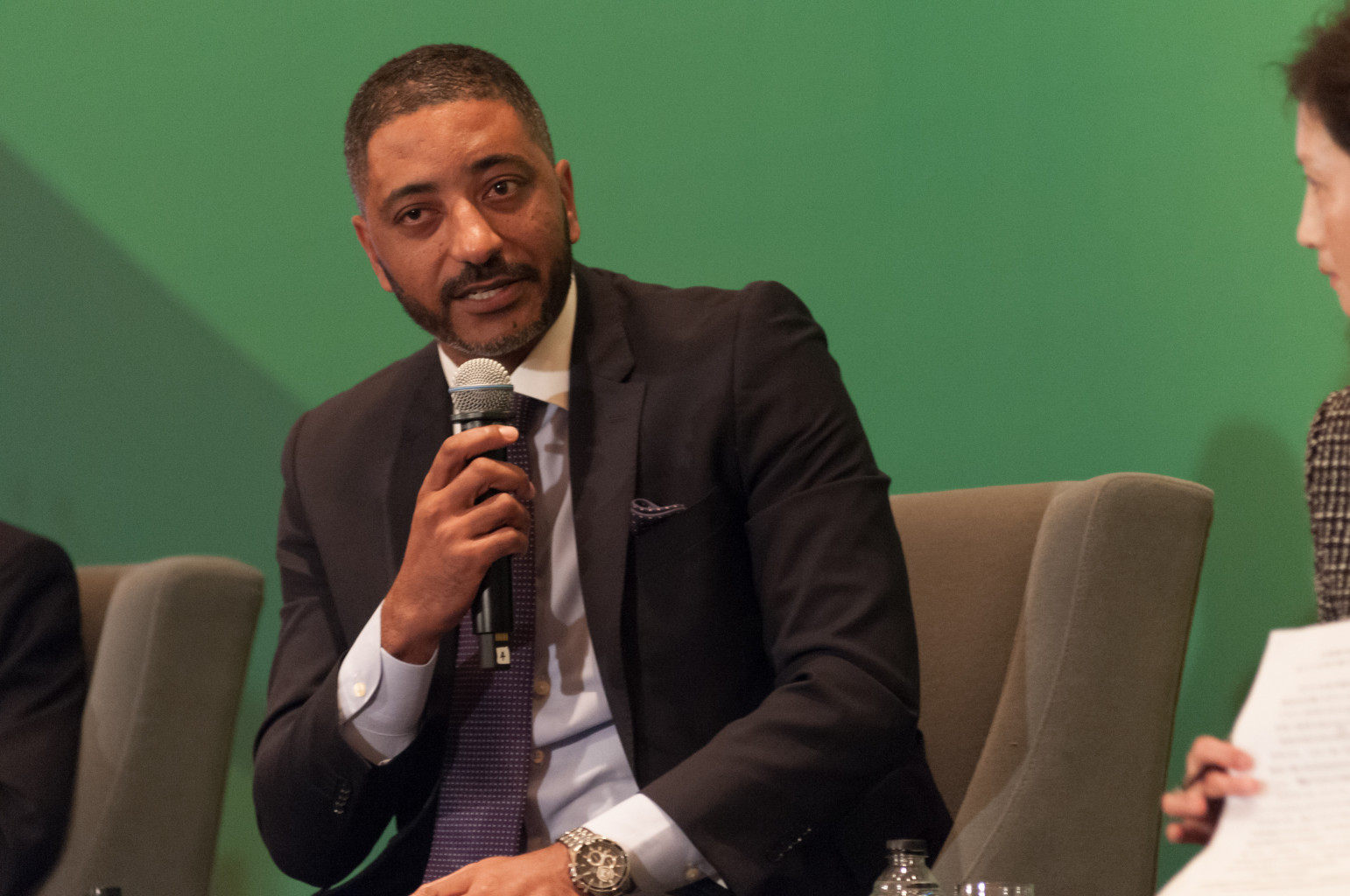
These efforts include a new official responsible for following up the Forum activities, revealed Caramuru:
“We are stepping up a little the way we follow the Forum’s activities. From now on, we may have a representative. He won’t be in Macao. He will be someone from our Hong Kong consulate who will be in charge of working more closely with the Forum.”
The move is a clear response to the Forum’s request to have Brazil more involved in the activities of the organisation, taking into consideration that China is the country’s main trade partner.
A business-oriented platform
Jorge Costa Oliveira, former secretary of state for Internationalisation of Portugal, shares the same perspective as Ambassador Caramuru in what concerns the nature of the Fund:
“That money is not there to be spent on something that doesn’t make any sense. Nor is it there only to be used as a reference in risk management assessment operations. Fifteen years have passed and that’s time enough,” he asserted. “We should be able to give an account on how we can improve the way the Fund operates.”At the request of Forum Macao, the Chinese Academy of Social Sciences has been commissioned to study the work the institution has been carrying out and present new targets and roads for the future. The most substantial one, believes Costa Oliveira, should be a change of focus:
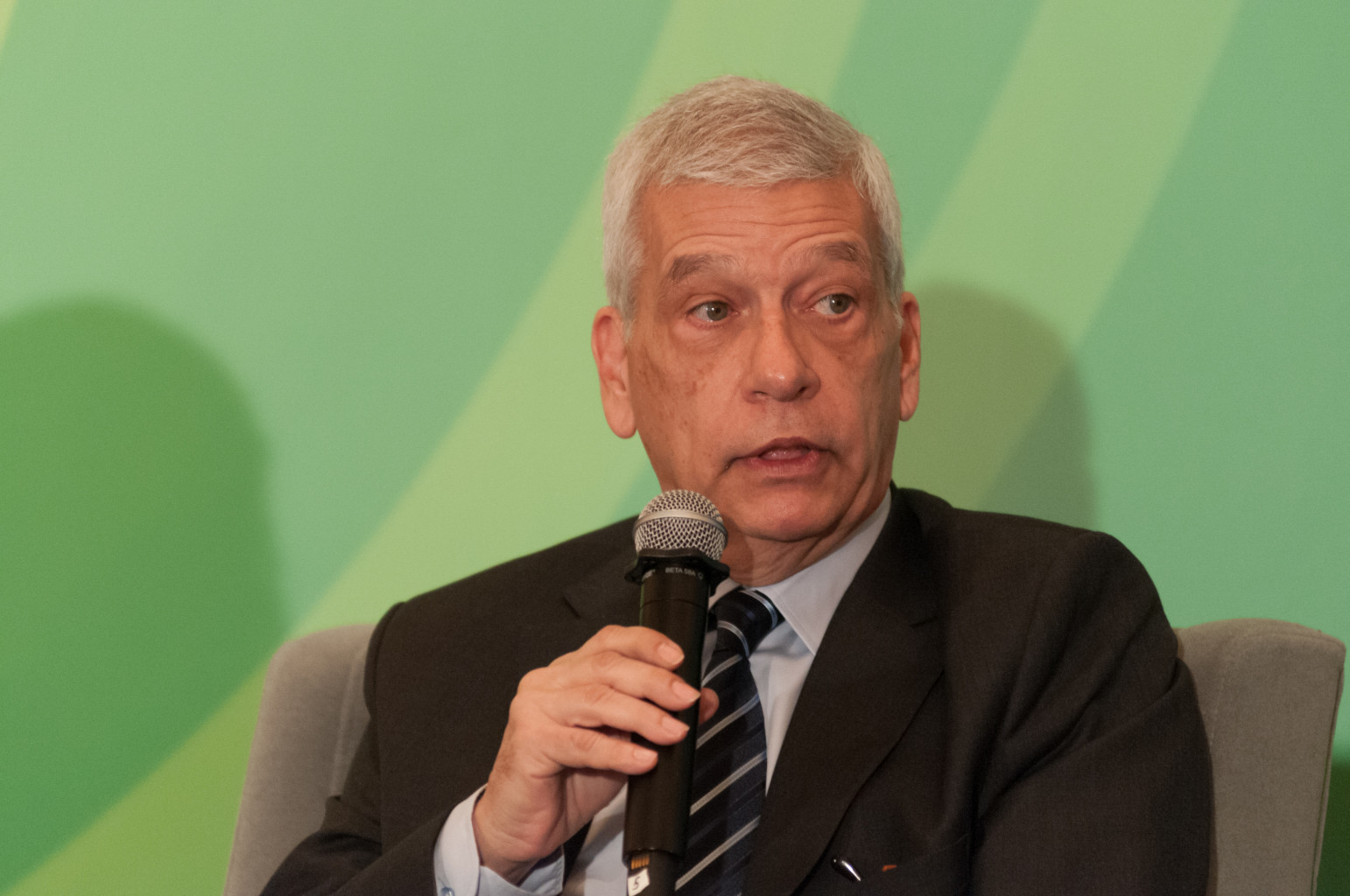
“Many of the initiatives that have been promoted in the last few years have an institutional connotation. The partners of Forum Macao in many of the Portuguese‑speaking countries are public entities and investment agencies,” he claimed. “What I proposed in this seminar is that the Forum should promote other kinds of events, focused on the private sector, in enterprises and business chambers and associations.”
Jorge Neto Valente, a lawyer and businessman who also serves as president of the Young Macanese Association, welcomes an eventual change of focus by Forum Macao if it will mean new opportunities for Macao’s small and medium‑sized enterprises (SMEs).“
Lately, we have been seeing the Forum granting a greater importance to small and medium‑‑sized enterprises. That should be the focus,” Valente said. “If we only look at the numbers, a deal between a Chinese state company and a country like Angola or Brazil will probably involve an amount a thousand times larger than the values associated with projects led by SMEs, but if the Forum doesn’t start looking at these kinds of companies as suitable partners, the business economic system everybody wants to see will never flourish.”
While a stronger connection with the private sector would be welcomed by many, there remain several other domains in which Forum Macao must be able to position itself, given their economic and political relevance.
The Silk Road Economic Belt and the 21st Century Maritime Silk Road – commonly known as the Belt and Road Initiative – offer a whole new range of opportunities for the members of institutions like Forum Macao, but these opportunities bring with them responsibilities to fulfil. One of the most compelling is to guarantee that local and national initiatives are properly articulated, stated Macao’s Secretary for Economy and Finance Leong Vai Tac in his intervention at the seminar:
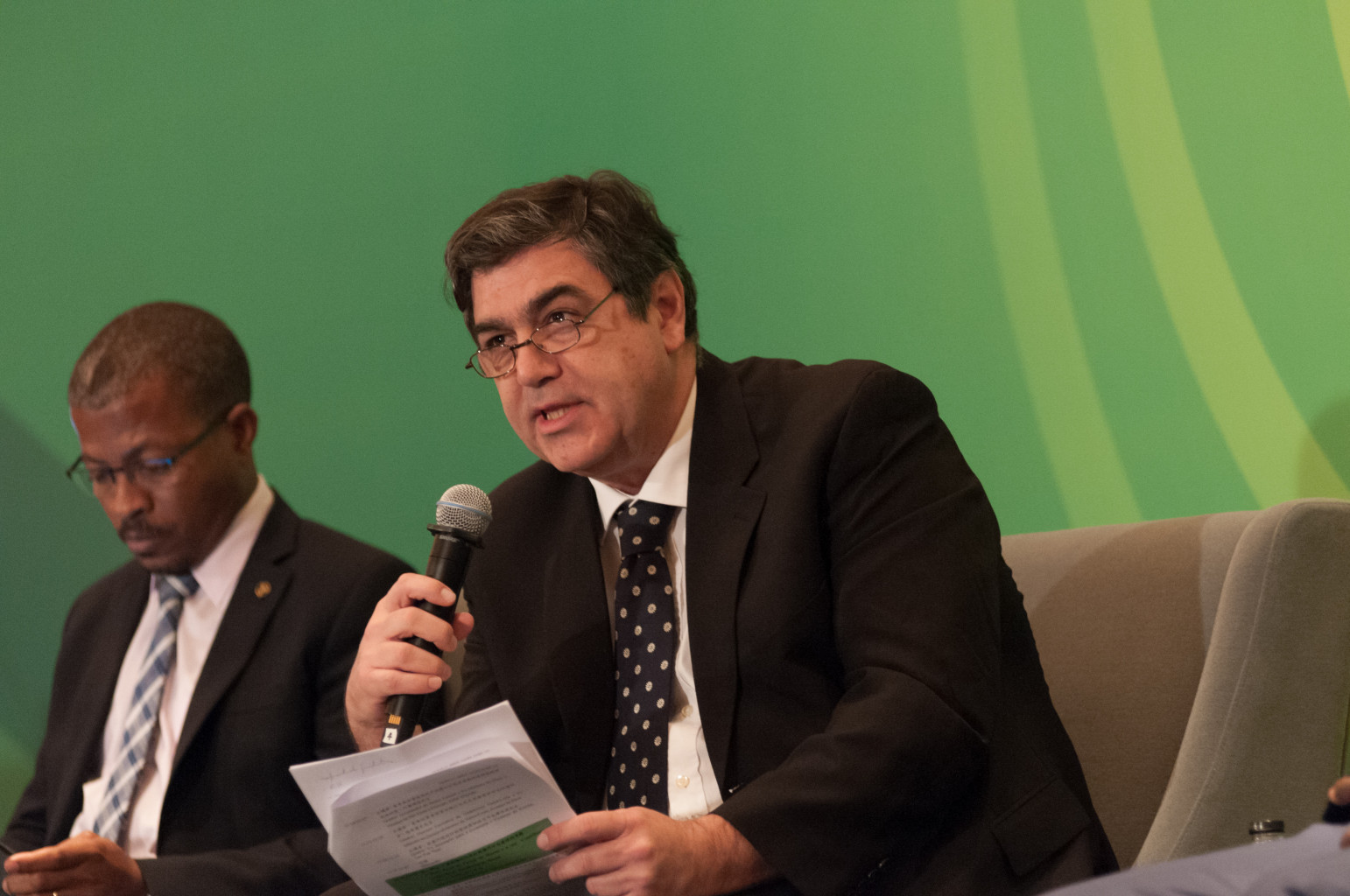
“The Special Administrative Region government will – in accordance with the specific needs of the People’s Republic of China and having in mind its own advantages – strictly articulate the construction of the World Centre of Tourism and Leisure and the service platform for co‑operation with the national Belt and Road strategy, contributing therefore to the fulfilment of the government’s actions,” he affirmed.
What I proposed… is that the Forum should promote other kinds of events, focused on the private sector, in enterprises and business chambers and associations.
Jorge Costa Oliveira
In his speech, Leong characterised the results obtained by Forum Macao during the last 15 years as “remarkable” and gave the guarantee that the Macao government will continue to actively support the Forum’s mission of building the service platform between China and the Portuguese‑speaking countries.
“Satisfaction” was the word used by Sun Tong to describe his feelings regarding the work made by Forum Macao since its inception in 2003. The director‑general of the Department of Taiwan, Hong Kong, and Macao Affairs of the Ministry of Commerce expects the Forum to show more “energy and vitality,” but also praised the results already achieved by the institution, especially in recent years:
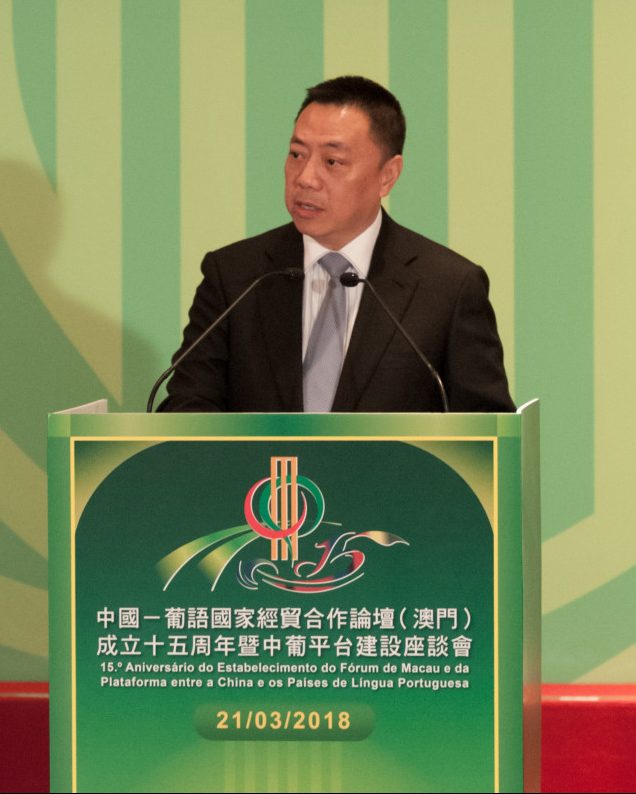
“The extent of the co‑operation among the different countries that take part in the Forum reached new levels, especially after 2013, when, under the orientation of the Belt and Road Initiative, the co-operation between China and the Portuguese ‑speaking countries gained new soundness,” Sun Tong stated.
“Forum Macao became a very relevant platform for co-operation between China and the Portuguese ‑speaking countries under the Belt and Road Initiative.”
He said that, as far as the vitality of the relationship between China and the Lusophone world is concerned, the numbers speak for themselves: direct investment from China in the Portuguese‑speaking countries increased 90 fold during the last 15 years. The Portuguese‑‑speaking countries, noted Sun, have invested as much as US$1 billion in the People’s Republic of China in the same period.
The numbers are impressive and so is the terrain already covered, said Guinean Ambassador Malam Sambú, the longest serving Portuguese ‑speaking diplomat in Beijing. But, he noted, the Portuguese ‑speaking countries will have to step up their commitment with the Macao platform if they want to take full advantage of some of the initiatives with which China proposes to change the world.“
The Portuguese ‑speaking countries need to show total commitment in order to face the challenges that are inherent to huge projects like the Belt and Road initiative, the improvement of our wealth-generating capacity or the Guangdong–Hong Kong–Macao Greater Bay Area development project,” Sambú said. “With this in mind, the Portuguese‑speaking countries wish to invest a greater importance in the expansion of Forum Macao. We will try to contribute to a higher level of organisation, as well as to make our representatives in the Permanent Secretariat more active and intervening. We will try to create the optimal conditions to improve the internal coordination mechanism in the future, always keeping in mind the Forum’s goals and purposes.”
The opinions and suggestions conveyed by members of the Forum won’t fall on deaf ears, assured Secretary‑General Xu. She promised that the organisation will focus its attention on the needs and expectations of the private sector, despite making it quite clear that the Forum “never intervenes” on the approval procedures of the Co‑operation and Development Fund:
“Most of those who took part in the seminar sustained that the Forum needs to have a stronger connection to the private sector. That is something that I fully agree with. In order to promote economic and commercial co-operation we need to mobilise private companies. We promise, therefore, new activities directed towards the business sector and we will transmit our support to the future Business Chamber between China and the Portuguese speaking‑countries, which has not yet been created, but that should be constituted soon,” Xu announced.
The initiative to create Forum Macao originated with the Beijing government in 2003, with full support of the Portuguese‑speaking countries. In the last few years, as the Forum has matured, China has shown clear signs that it would like to find new ways to make the institution more active.
In 2017, the Chinese Ministry of Commerce appointed Ding Tian as the new deputy secretary‑general of Forum Macao, and the year before the Ministry of Commerce appointed Xu Yingzhen as secretary‑general of the institution. By strengthening its structure with higher‑level personnel, the Chinese government has made clear to the eight Portuguese‑speaking countries represented at Forum Macao that they should also rethink their respective approaches.
